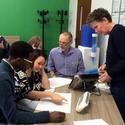 Staff and volunteers from the School of Computing and the School of Medicine delivered a successful workshop at the fourth UK Council of Clinical Communication Conference held in Manchester on 11 March 2015.
Staff and volunteers from the School of Computing and the School of Medicine delivered a successful workshop at the fourth UK Council of Clinical Communication Conference held in Manchester on 11 March 2015.
The workshop showcased the work being done within the communication strand of the Dundee medical curriculum led by Drs Ching-Wa Chung and Jennifer Kennedy (GP clinical tutors) and members of the StraightTalking User Group led by Professor Annalu Waller and Mrs Kathleen Cummins from Computing.
 The interactive session explored how a new workshop about augmentative and alternative communication (AAC) was developed and integrated within the medical curriculum at Dundee University. The focus of the session was to outline an approach to the engagement of disabled volunteers to participate in medical education and to identify the challenges of developing an educational session that focuses on communication skills, and promoting healthy attitudes towards disabilities.
The interactive session explored how a new workshop about augmentative and alternative communication (AAC) was developed and integrated within the medical curriculum at Dundee University. The focus of the session was to outline an approach to the engagement of disabled volunteers to participate in medical education and to identify the challenges of developing an educational session that focuses on communication skills, and promoting healthy attitudes towards disabilities.
 Alan McGregor, who uses AAC, ran a shortened version of a 2 hour workshop which has been delivered to all 2nd year medical students. Conference delegates rotated between three stations: they had the opportunity of engaging with Alan and another volunteer and tried out some AAC systems. The delegates ended the session by discussing the benefits and challenges of involving disabled people in medical education and shared their own experiences of good practice and tackling difficulties.
Alan McGregor, who uses AAC, ran a shortened version of a 2 hour workshop which has been delivered to all 2nd year medical students. Conference delegates rotated between three stations: they had the opportunity of engaging with Alan and another volunteer and tried out some AAC systems. The delegates ended the session by discussing the benefits and challenges of involving disabled people in medical education and shared their own experiences of good practice and tackling difficulties.
 None of the workshop participants reported any knowledge of AAC. The feedback indicated that this type of education was powerful in terms of introducing students to complex communication issues and building confidence in interacting with people who have severe speech disabilities. The involvement of people with disabilities in the development and delivery of such training was considered to be essential.
None of the workshop participants reported any knowledge of AAC. The feedback indicated that this type of education was powerful in terms of introducing students to complex communication issues and building confidence in interacting with people who have severe speech disabilities. The involvement of people with disabilities in the development and delivery of such training was considered to be essential.
